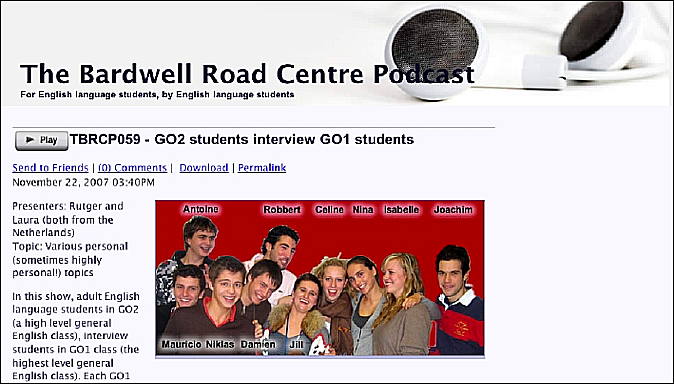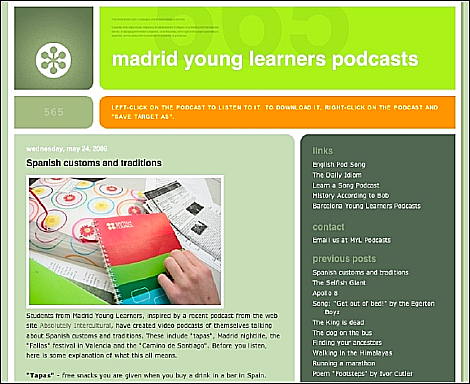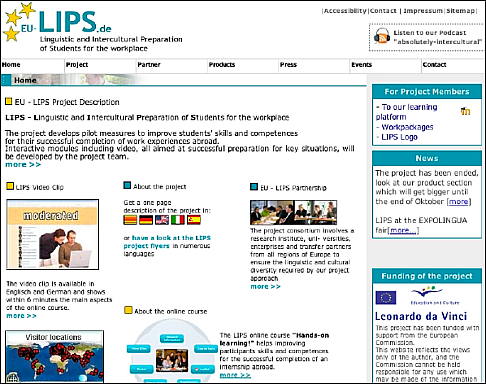
March 2008
Volume 11, Number 4
| Contents | | | TESL-EJ Top |
 |
March 2008
|
||
|
 gmail.com>
gmail.com>
Talk-radio podcasts, such as Absolutely Intercultural, which are not overtly pedagogical, can be much more than passive, extended listening practice. This paper describes two examples in which teachers have used the Absolutely Intercultural podcast and discusses the different levels of involvement possible with podcasts from listening to producing and how these are based on our current understanding of what constitutes effective learning approaches. This is a step-by-step guide, centering on pedagogical rather than technical issues, about how to involve target language podcasts in EFL teaching.
What follows is based on the philosophy that students should participate in their own learning as much as possible. This is further based on the changing understanding in the last thirty years or so about what makes for effective learning. The transmission model where the teacher is the sole repository of knowledge that has to be transferred to the learners has given way to an understanding that people are intrinsically motivated to learn in general and learn language in particular (Pinker, 1994) and will do so most effectively when:
Foreign language acquisition is a skill, more than a body of facts, acquired with practice; therefore, sustaining motivation and promoting lengthy practice outside the classroom are key factors. The urge to communicate is very strong in humans and is what ensures first language acquisition in the first place (Pinker, 1994); therefore, creating the desire to communicate in the target language will also be a strong motivator for its acquisition. Podcasts, described below, meet the criteria for effective language learning in a number of ways.
There are many sources of sound on the Internet but not all audio is a podcast and not all podcasts are simply audio. Podcasts were originally audio files uploaded to the internet to be downloaded onto a mobile device such as a cell phone, mp3 player--such as iPod--or else simply to be listened to directly from the computer. An important feature that makes the online audio file into a podcast is the possibility of subscription, so that the listener is alerted when a new episode is available and may even have it automatically downloaded onto a computer ready for listening or transfer to a mobile device. A podcast can also include video or pictures. Podcasts also often have a Web location on a blog where information, sometimes called "show notes," about each episode is also stored and where listeners can interact with the podcasters through email or a comment function. See for example the Absolutely Intercultural blog page in Figure 1.

Figure 2. Absolutely Intercultural
Several features of podcasts make them superior to radio programmes as a listening experience for learners:
My purpose is to demonstrate that talk radio type podcasts, such as Absolutely Intercultural, may have applications beyond the advanced learner target group in language learning. There are, of course, tailor-made language learning podcasts, which can be listed in order of the increasing generality of the learning object:

Figure 2. The Bardwell Road Centre Podcast: TBRBC059 - G02 students interview G01 students (Taylor, 2007, http://bardwellroad.podomatic.com/entry/2007-11-22T15_40_10-08_00).
Talk radio podcasts such as Absolutely Intercultural, which students listen to more for the content than explicitly for language learning, are not produced primarily with language learners in mind. While the purposes of the four types of podcasts listed above are fairly obvious, it is worth exploring the possibilities for using talk radio type podcasts as part of an English class. We will take Absolutely Intercultural as an example. This podcast started in March 2006, and comes out once every two weeks. The podcast is hosted by the author in Denmark and Dr. Laurent Borgmann in Germany. Each show lasts approximately twenty minutes and comprises between three and six topics. Issues covered are all related in some way to intercultural communication, including theory, case studies, conference reports, training approaches, country and event reports as well as gossip and reports from cultural informants. This podcast can have many uses in the EFL classroom. Possible strategies include:
There may be more options for the use of the finished audio product but podcasts also offer opportunities to explore active interactions. These range from the easiest option of adding a comment to the blog that is almost always associated with a podcast to the most involved option of creating and maintaining a regular class podcast. These options exercise productive language skills as against just receptive listening skills. These options also apply the learning theories mentioned above by providing opportunities for authentic communication, step-wise progression to steadily more challenging tasks that, in the most involved options of producing podcast material, may lead to flow in the sense described by Csikszentmihalyi (1990).
Most podcasts tend to be informal and invite feedback and interaction with listeners, so this affords an ideal opportunity to promote authentic use of the target language as against the completion of dry exercises that have no context. Therefore, one of the main advantages of using podcasts in this way is to increase intrinsic motivation to use the target language. This is well illustrated by the story of Steve Evans of the British Council in Madrid. (Evans created the Madrid young learners podcast [http://mylcpodcasts.blogspot.com]; see Figure 3.) The following is an edited transcript of the conversation we had with him about his use of our podcast in his classes:
Steve: I came across the site Absolutely Intercultural and I thought it looked very interesting as an idea, first of all, and then I looked at the first show . . . and it was about tapas in Leon and people visiting Spain. . .
Laurent: Yes, that was our first show and we wanted to give an insight into Spain. Of course we looked at it from the outside, what did you think about it?
S: Well that was what I found so interesting about it because I knew that my students who are about 14, 15, 16 years of age and who are very passionately interested in promoting Spain to other people, that they would be interested to hear what other people thought about them. So I decided to build an English lesson around the podcast. They listened to what other people thought about what they thought was the truth about the Spanish diet, tapas and siestas. They were interested to hear it and they very quick to pick up on things that they thought were not entirely accurate.
L: That was exactly what we wanted . . . We had asked people on the blog to get in touch with us. Quite a number of your students did. . . .
S: Well I got my students to sit down after we had heard the podcast and to write their thoughts about what they'd heard as comments to the blog. I also told a number of other teachers in the school so that's why there were so many replies. I'm fortunate because I teach in a classroom that has a data projector, an interactive whiteboard and a suite of computers and so on so I was able to broadcast the webpage at the front of the class and they were able to hear it altogether through a very good sound system. Then when we'd talked about it and they'd discussed it, we then went to the computers and they wrote up their answers.
L: What was the next step?
S: They posted something and then I thought that that was probably the end of that. But then I noticed . . . that their names had been mentioned in the replies and that the things that they'd said had been talked about and I thought that this was an opportunity too good to miss. I'm sure that they would be thrilled to hear it. And they were! They were very surprised to hear that people had been interested in what they'd said and were very clearly very impressed. I played it back to them again through the same sound system. I could see that they were interested and motivated by what had happened.
L: Now we heard that they are doing their own podcast. Is that true?
S: Yes, that's right. I spoke to them about it and it was clear that they had plenty more to say on the subject. I proposed to them that we'd make a mini project out of it and that instead of just recording them we would video them talking about similar subjects, not the same thing. So we had a period of two to three weeks where we would discuss it at the end of the class and we'd decide what they wanted to do and when they were ready they sat down for 30 minutes, did some research, decided exactly what they were going to say and I said to them that they weren't allowed to read aloud from a script. So they were very well prepared. They thought about it a lot. They were very enthusiastic. They sat in front of the camera, in one take in nearly every case, and talked about Madrid nightlife, typical Spanish festivals and that kind of thing. They did a very good job. I was very impressed. I think the whole process from beginning to end was very interesting for them, very motivating and very productive.
As this discussion with Evans indicates, the Absolutely Intercultural shows could be included in teaching at fairly short notice and the transcript reveals the high level of motivation achieved, firstly, because the topic was engaging to the learners, and secondly, because of the interaction which happened afterwards. The transcript also demonstrates how a teacher can begin with a low risk activity and, based on student enthusiasm, gradually attempt more complex tasks once the necessary motivation and expertise has been secured.

Figure 3. Madrid young learners podcast. (Evans, 2006).
A second example illustrates how the show has been used in a very different context. The EU-LIPS (Linguistic and Intercultural Preparation of Students for the Workplace) project [http://www.eu-lips.de], supported by the European Union, centered on the development of an e-learning course to give students about to leave for a foreign internship some intercultural competencies and linguistic tools for a more effective stay. (Although the project is currently at an end, the courses developed under it continue in modified form; see Figure 4.)
Course participants were encouraged to subscribe to the Absolutely Intercultural podcast on a regular basis but particularly relevant topics were highlighted during the course and a direct link to the relevant show was then provided. One example is Absolutely Intercultural show number 21 [http://www.absolutely-intercultural.com/?p=40], and the podcast segment on "Image Projection," which was about creating an image or "identity." Participants are alerted to this show because a stay abroad is an opportunity to play with one's identity for various reasons--including that an internship marks the transition from student to employee. Of great importance also is that the identity of "employee" may mean different things in different cultures, so it is relevant to ask participants to give explicit consideration to the question of identity in this context. A good illustration of this transition in identity was provided by the interview with Vera, a German student with an internship in Denmark. In the podcast, Vera talks about how it was not enough to talk good English but that she also had to think about which stereotypes of Germans her colleagues might have and how this might affect their reaction to her and what she could do to counteract this stereotyping. In turn, students gain a great deal from hearing about the experiences of their listener-peers, and this is possible via interaction through the blog. One example is a Spanish student, Fernando, who contributed several audio comments relating to his internships in Germany and the USA (see show number 22 [http://www.absolutely-intercultural.com/?p=42]).
The LIPS online course was offered to students throughout Europe, most of whom do not have English as their first language. Use of the podcast as part of the learning materials gives a powerful motivation to listen to the podcast to extract meaning as against being a purely linguistic exercise. And in a time when people are increasingly aware of the benefits of lifelong learning, podcast participation could even contribute to the formation of a good habit to be continued after the end of the course where the very structure of podcasts encourages listeners to become part of the learning community.

Figure 4. EU-LIPS.de
Students may be encouraged into increasingly complex interactions using podcasts as follows:
A final advantage of using English language podcasts that are not produced explicitly for language learning purposes is the accidental learning which might occur while dealing with topics such as the intercultural content of Absolutely Intercultural. Podcasts might be chosen on the basis of their content about business practices for a business or commerce course, information about the country where the target language is spoken for a language and culture class, technical matters for a computer or science course, or whatever else is relevant to the learners' plans and interests.
Some teachers may find the thought of recording what amounts to a radio show intimidating, but services such as PodOmatic minimize the amount of technical expertise needed. Teachers should also remember that many of their students now carry mobile phones capable of making adequate voice recordings, and these give readily available opportunities for students to record themselves or others outside the classroom. Once experience has been gained in this area, podcasts could also be seen as one option amongst a range of possibilities for using and producing authentic materials with the new functions of collaborative, online tools, as described by Stevens and Dieu (2007).
In conclusion, podcasts meet the need for oral activities that are often otherwise neglected in the EFL classroom. Teachers may not realize that using podcasts actively can start in a low risk way that can be developed further if students show an interest. Talk radio podcasts offer the pedagogical potential for varying degrees of involvement in interaction and proffer student engagement that promotes effective and deep learning according to currently accepted cognitive theories. Subscribing to podcasts also has the potential to promote life-long learning that engages students in motivating authentic experiences with a global audience.
Note
The recording of the WiAOC [http://wiaoc.org] original presentation may be found at Learning Times [http://home.learningtimes.net/learningtimes?go=1563011]. Free registration and log-in are required.
Absolutely Intercultural. (2006-2008). http://www.absolutely-intercultural.com.
Audacity http://audacity.sourceforge.net.
Bardwell Road Centre Podcast. (2006-2008). http://bardwellroad.podomatic.com.
Breaking News English: Ready-to-use EFL/ESL Lesson Plans and Podcast. (2004-2008). Available from: http://www.breakingnewsenglish.com.
Csikszentmihalyi, M. (1990). Flow--The psychology of optimal experience. New York: Harper & Row.
EU-LIPS.de (Linguistic and Intercultural Preparation of Students for the Workplace). (2007). European Union. http://www.eu-lips.de.
Madrid young learners podcast. (2006-2008). http://mylcpodcasts.blogspot.com.
Pinker, S. (1994). The language instinct: The new science of language and mind. London: Penguin Books.
PodOmatic. (2008). PodOmatic, Inc. http://www.podomatic.com.
Siemens, G. (2006). Knowing knowledge Available from:. http://www.elearnspace.org/KnowingKnowledge_LowRes.pdf.
Splendid speaking: Speaking skills for advanced learners of English. (2006-2008). http://splendidspeaking.podomatic.com.
Stevens, V, & Dieu, B. (2007). Pedagogical affordances of syndication, aggregation, and mash-up of content on the Web. TESL-EJ, 11(1). http://tesl-ej.org/ej41/int.html.
The Virtual Language School. (n.d.) http://www.virtuallanguageschool.com/english/.
Special English: Learning American English and Much More. (2008). Voice of America: News VOA.com. http://www.voanews.com/specialenglish/.
Vygotsky, L. (1962). Thought and language Cambridge, MA: MIT Press.
Windows Media Player 10. (2007). Microsoft Corp. http://www.microsoft.com/windows/windowsmedia/player/10/.
Word of the Day. (2007). Merriam-Webster, Inc. http://www.m-w.com/cgi-bin/mwwod.pl.
|
© Copyright rests with authors. Please cite TESL-EJ appropriately.
Editor's Note: The HTML version contains no page numbers. Please use the PDF version of this article for citations. |